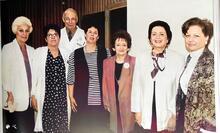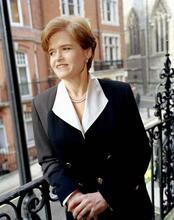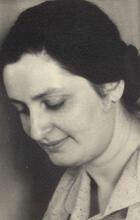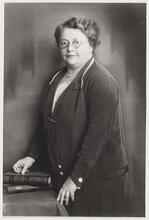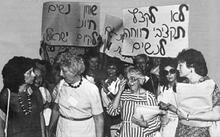Anna Sophia Polak
Anna Polak was an important figure in the Dutch women’s movement in the early twentieth century, who served as director of the National Bureau of Women’s Labor in The Hague for 28 years. While medical opinion at the time held that young middle-class women were too weak for serious work, Polak controversially argued that their weakness was a result of their lack of serious efforts and a goal in life, and that labor was imperative to happiness; she contested that a woman’s fulfillment depended on finding a husband. Her expertise was recognized internationally, and she served on many international councils, committees and alliances dedicated to the interests of feminism and the broader labor movement.
When journalists interviewed her in 1926, Anna Polak said that her private life was not relevant, and that she would rather speak about the National Bureau for Women’s Labor. The reply characterizes Polak, who completely devoted herself to her task as director of the National Bureau.
Early Life & Development of Labor Ideology
Anna Polak was born in 1874 into an intellectual, liberal Jewish family in Rotterdam. Her parents, Herman Joseph Polak (1844–1908), deputy headmaster of the prestigious Erasmiaans Gymnasium [high school], and Louisa Helena Stibbe (1848–1936), had two children, but Anna’s brother died aged one in 1873. Anna graduated from both the Girls’ High School (MMS) and the Gymnasium. In 1894 the Polak family moved to Groningen, where Herman Polak had been appointed university professor in Greek. Here Anna taught Italian. More importantly, she became involved in the preparations of the National Exhibition of Women’s Labor 1898, the pinnacle of the nineteenth-century Dutch women’s movement.
The National Exhibition led to Anna’s book, Vrouwenwerk in Nederland. Beschouwingen over eenige zijden der vrouwenbeweging (Women’s Work in the Netherlands. Reflections on Some Aspects of the Women’s Movement, 1902). While medical opinion at the time held that young women from the middle classes were too weak for any serious work, Anna—in the spirit of the National Exhibition of Labor—argued the opposite. If young middle-class women suffered from a lack of vitality, it was not because they were overexerting themselves, but because they lacked serious efforts and a goal in life—other than waiting for “Mr. Right.” The idea that labor did not have to be something negative, but, on the contrary, could be “one of the richest sources of joy of life for every healthy adult, man or woman,” would be a lasting theme in Polak’s work. In 1914 she even wrote that labor—if performed under acceptable circumstances—was a necessary ingredient for the happiness of every human being. She contested the notion that a woman’s fulfillment depended on finding a husband. Besides labor, one needed to love someone, but for a “normal woman that person does not necessarily have to be a man. She can give her love to a mother, a sister, a friend, an adopted child—as long as this is a human being who reciprocates her love.” For Anna this was not mere theory: she remained single but lived together with her mother from 1908, when her father died, until her mother’s death in 1936. Anna Polak was not interested in women’s work only because of its psychological-emotional value; she also strongly believed that women should be economically independent.
Leadership Positions
In 1908 Anna Polak became director of the National Bureau of Women’s Labor in The Hague, bringing to her work a sharp, analytical mind, social feeling, dedication to the women’s cause, strong idealism, and an intense dislike of women’s discrimination in the labor market. Throughout her twenty-eight-year leadership of the National Bureau she closely cooperated with its vice-director, Marie Heinen. Their work consisted in doing research in and publishing on women’s paid and unpaid work, giving advice about career choices to girls and women throughout the country, and reacting to political developments which—potentially—affected women’s position in the labor market. Polak published some fifty-five booklets as well as dozens of articles in journals and national newspapers. From 1922 until 1936 she was a member of the High Council of Labor, an influential advisory body to the Dutch government. Her expertise was recognized internationally as well: she was chair of the Trades and Professions Committee of the International Council of Women (1920–1925), Dutch delegate (1920 and 1923) and member of the Committee for Like Conditions of Work (1929) in the International Alliance of Women, and a member of the Comité d'Experts pour le Travail Féminin of the International Labor Organisation (ILO) in Geneva (1932–1936).
However, the political and economic climate of the interwar years was very unfavorable towards any notion of women’s economic independence. Dutch governments from 1924 on issued laws and regulations which limited women’s paid work, always restricting the more intellectual and better-paid jobs and always with the aim of protecting men’s work. The fight against this proved to be an uphill battle.
Polak’s Legacy
Anna Polak left no personal documents, except for the many letters and cards now in the archive of the National Bureau for Women’s Labor that came in to congratulate her when she received a knighthood (the Dutch equivalent of an OBE) in 1926. They show that she was loved and admired by a wide circle of people, mostly from the women’s movement, many of whom extended their congratulations to her mother as well. The lack of sources makes it difficult to say much about the relevance of Polak’s Jewish background. However, if women’s paid labor and a social consciousness are recognized as important aspects of Jewish culture, it is clear that Polak was part of that tradition. A special interest in Jewish women is visible in her connections with the Council of Jewish Women, and in her article in the Maandblad van den Joodschen Vrouwenraad (Monthly of the Jewish Council of Women) of July 1926, in which she urged Jewish women not just to choose intellectual labor, but also to consider other types of employment, such as nursing, since that would improve their position on the labor market.
The last years of Anna Polak’s life were hard. In the same month that her mother died, September 1936, Anna had to give up her position for medical reasons—she showed signs of what probably was dementia. In 1941 she was admitted to a psychiatric asylum. She died in Auschwitz on February 26, 1943, aged sixty-nine.
Women’s right to paid labor was almost constantly under attack during the first half of the twentieth century. Few people in the Netherlands did more to defend that right than Anna Polak.
Selected Works
Vrouwenwerk in Nederland. Beschouwingen over eenige zijden der vrouwenbeweging. Groningen: 1902.
Leidraad voor de Amsterdamsche meisjes bij de keuze van een beroep. ‘s-Gravenhage: 1913.
“De arbeid der vrouw.” Werker-Beaujon C.M., Clara Wichman, and W.H.H. Werker, ed. De vrouw, de vrouwenbeweging en het vrouwenvraagstuk. Encyclopaedisch handboek. Amsterdam: 1914. 204–225.
“Het standpunt der Staatscommissie over de Werkloosheid ten opzichte van den arbeid der vrouw.” Vragen des Tijds, part 2 (1916): 85–109.
Vrouwen van beteekenis. ’s-Gravenhage: 1929.
Het voor en tegen van arbeidsvrijheid voor de gehuwde vrouw. Praeadvies voor den Nationalen Vrouwenraad van Nederland. Leiden: 1932.
Eijl, Corrie van. Het werkzame verschil. Vrouwen in de slag om arbeid, 1898–1940. Hilversum: Verloren, 1994
Haan, Francisca de. “Anna Polak.” Biografisch Woordenboek van Nederland part 5 Den Haag: 2001. 391–393
Haan, Francisca de. Gender and the Politics of Office Work in the Netherlands, 1860–1940. Amsterdam: Amsterdam University Press, 1998.
National Bureau for Women’s Labor. Archives. International Information Centre and Archives for the Women’s Movement, Amsterdam.
Netscher, Frans. “Karakterschets. Anna Polak.” De Hollandsche Revue 19 (1914): 558–566.
Veer, Hélène van der, “Anna Polak.” Biografisch Woordenboek van het Socialisme en de Arbeidersbeweging in Nederland, part 3. Amsterdam: 1988, 169–172.


